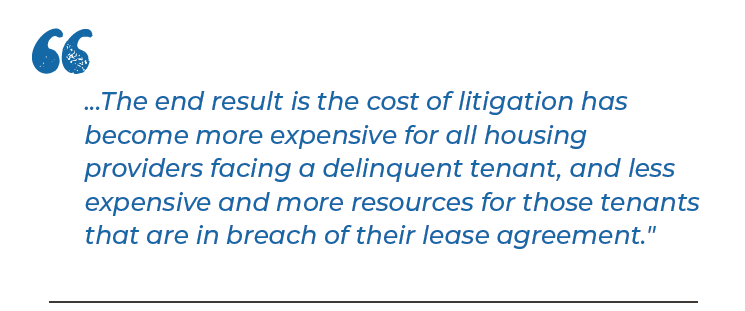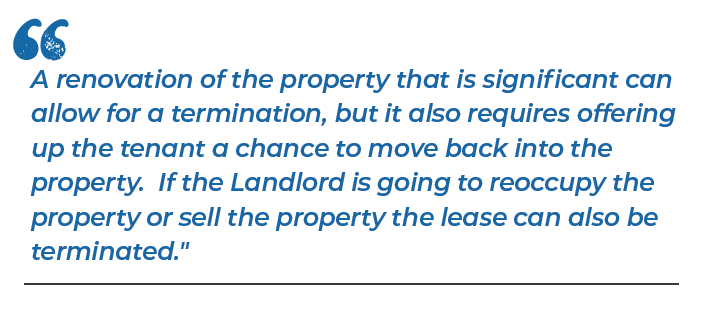Navigating The New Laws that Impact Your Business
The ever changing legal landscape for property owners and property managers underwent a major shift in 2024. There were more proposed bills in 2024 impacting property management than gun control. It can be difficult to sort through all of the noise of the session, so the goal here is to make you aware of things that you need to be aware of if you are a property owner or a property manager, and of course with all of these new laws there can be various interpretations and operational changes to adopt that are best discussed with your legal counsel.

Perhaps the best example of the imbalance that this past session brought to the industry is best reflected in two House Bills that serve different purposes but ultimately make it more expensive for housing providers and less expensive for tenants to litigate disputes in Court. HB 24-1099 eliminates filing fees for tenants in eviction proceedings. That this bill was even proposed was surprising, as there was already a mechanism for eligible tenants to get their filing fees waived. Tenant advocates have voiced their support of this bill because those advocates found it burdensome and challenging to help tenants get the information tenant’s needed together to complete the waiver. Starting in November 2024, it does not matter if your tenant qualifies for a waiver, or makes a six figure income, all tenant’s do not have to pay a filing fee. Contrast this with the impact of HB24- 1286, the Equal Justice Fund Authority, which imposes a fee starting in 2025 on all County Court Cases of an additional $10 a case, in order to assist with funding programs to promote access to legal advice for low-income individuals. The end result is the cost of litigation has become more expensive for all housing providers facing a delinquent tenant, and less expensive and more resources for those tenants that are in breach of their lease agreement.
This is a reflection of the imbalance that was brought about this year. The session had a feeling of deja vu from 2023, seeing bills related to Cause Evictions and Rights of Refusal or Offer being run again. The results in 2024 were different with both bills passing. The Right of First Refusal HB24-1175, now provides local governments the right to make an offer on affordable multifamily properties. The ultimate impact on the markets for this remains to be seen, the positive changes for the industry would be that the restrictions and time periods are improved from the 2023 version.
HB24-1098, is a bill that addresses what the proponents identified as a problem with landlords discriminating against tenants by terminating their leases in a discriminatory manner. Despite protections existing under the law that prohibited landlords from engaging in discriminatory actions, the sponsors indicated that this was a necessary step for Colorado. This new law creates a more complicated process for dealing with lease defaults, and makes the eviction process more complicated than it has ever been in Colorado.
The ability to non-renew tenants now depends on how long the tenant has been a tenant. Tenants that have been at the property for 12 months or more have different rights than tenants that have been at the property for less than 12 months and have leases that are ending in less than 12 months. The additional protections identify limited scenarios for the basis of non-renewing the lease.
Landlords can non-renew a lease for a tenant that has been at the property for longer than twelve months, some of these scenarios are unlikely to apply to a multifamily setting. If there is a demolition of the property, then a landlord can terminate. A renovation of the property that is significant can allow for a termination, but it also requires offering up the tenant a chance to move back into the property. If the Landlord is going to reoccupy the property or sell the property the lease can also be terminated. All of these notices require 90 days notice to terminate.
Another ground for a non-renewal that is permitted would be a tenant has been late 3 times with payment of rent. The late payment though is redefined by 1098, to reference payments made after a tenant has an expired rent demand, so this limits the non-renewal to tenants that have been habitually late and cured late in the eviction process.

A non-renewal can also be given when a tenant fails to accept a reasonable renewal offer. This is an area where there could be room for interpretation as to what a reasonable renewal offer is, because what is reasonable to a tenant and a landlord will often be different.
There have been changes to the eviction notices as well. The law now requires that notices have to be served in the primary language of the tenant. If you do not know the primary language, then it is acceptable to serve the notice in English. This creates new challenges for documenting and tracking which languages are being spoken, and the logistics for some communities make just the preparation of the notices daunting.
Eviction notices now also need to include a specific date of termination on the demand. Eviction notices have not changed in how they need to be served, the change is how many attempts have to be made before a Landlord can post ademand. Two attempts have to be made on different days at personal service before an eviction notice can be posted on a door.
SB24-094 presented another overhaul to the warranty of habitability in Colorado. This may seem familiar because in 2023 there were modifications to the warranty of habitability. This bill makes major adjustments to the mechanisms of notice, timelines, and alternative housing. On some level the law is still the same, if there is a problem that impacts habitability it needs to be addressed in a timely manner. That part is fundamentally the same. Everything else surrounding how a problem is identified and communicated to the landlord, how easy it is now to demand alternate housing, has all changed.
Landlords must include language in their online portal right away regarding how to notify the landlord about a warranty of habitability issue, in English and in Spanish. Similar language must appear in all leases beginning in 2025. Leases must also advise tenants of the warranty of habitability.
The prior version of the warranty of habitability was very restrictive as to how a tenant had to provide notice, the new law reverses that restriction. Notice of an issue can now be provided by anyone in almost any manner. It can be from the government, from another tenant, from an unauthorized occupant, and it can be verbal or written notices. This puts a priority on companies training their employees and vendors to listen to and report anything that resembles a repair request.
The timelines established by the new law run from when a matter is reported to the landlord, so being aware of when something is an issue is critical to addressing the issue in a timely manner. There is a 24 hour time period to provide an initial response to a tenant, including advising them of their rights under the warranty of habitability. In addition, the clock is 7 days for repairs that involve life, health, and safety issues, or 14 days to remediate other matters.
Air conditioning, while not being required in all houses, now does fall under the protections of the warranty of habitability. If it exists it must be maintained and repaired, and if it does not exist a tenant may have rights to install it, with some limitations.
Alternative housing has gotten more complicated and expensive for landlords, as new requirements require that the alternative housing have the same number of beds that a tenant has in their unit. The hotels also have to be located near the property (within 5 miles) and if the stay is more than 48 hours, there must be a stove or cook top and a refrigerator with a freezer. If that cannot be provided a landlord can go further out up to 10 miles, or provide the tenant with a per diem.
The law has a new and different timeline for keeping records related to warranty of habitability issues, during the tenancy plus three years. This applies to those who manage their own property and licensed property managers.
There is again new legislation regarding towing, that limits who can authorize a tow, forcing that authority to come from a tenant or an employee of the property management company. This will require operational changes to towing practices that should be discussed with your towing provider.
This legislative session generated laws that are lengthy and complex, and this article only touches on some of the big topics from 2024. The takeaway is in order to be a housing provider in Colorado, you need a professional property manager in your corner to help you operate and comply with the ever evolving legal landscape.
